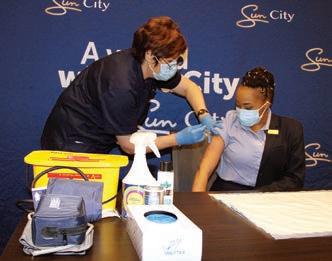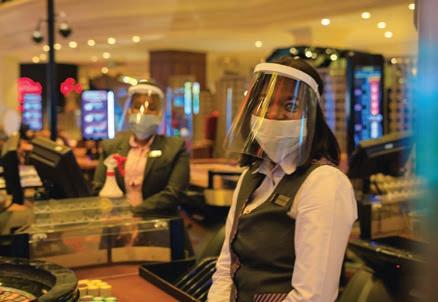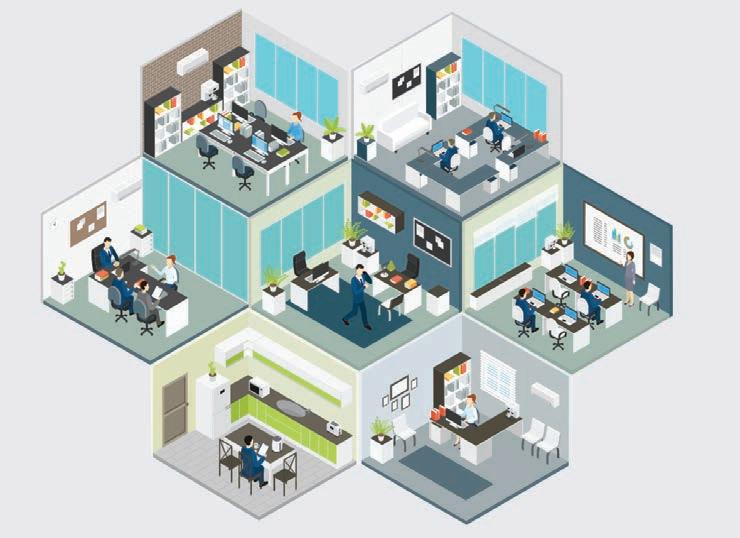
21 minute read
TOURISM
SHO’T LEFT: REBUILDING OUR ECONOMY BY RETHINKING LOCAL TOURISM

Although growth potential is limitless, the travel sector has taken a savage beating during the pandemic. With World Tourism Day celebrated on the 27 September, we took a look at how travel is rede ning itself in Limpopo, North West, and the Free State in a bid to revive local economies. By Keith Bain

FREE STATE: UNHERALDED GEMS AND NOVEL EXPERIENCES
“When I think about a South African living in Cape Town or Johannesburg, I don’t think the Free State is one of the destinations that immediately comes to mind for them,” says Johan Oosthuizen, GM of Bloemfontein’s Windmill Casino, a Sun International property that has traditionally relied on locals for around 90 per cent of its tra c. “Most people from up north are dead set on the coast, the Drakensberg, or maybe Kruger.” Oosthuizen says when his team puts together packages to lure customers to Bloemfontein they often feel sti ed by a lack of big-draw attractions.
It’s essentially a perception issue, though, says Kgotso Tau, head of communications in the province’s Department of Economic Development, Small Business, Tourism and Environmental A airs. He believes the Free State has the potential to evolve from being a “drive-through province” to being a “drive-to province”. The trick, he says, is not to compete with the coastal provinces or with Mpumalanga, but to highlight Free State’s unique attributes. “What they have, we don’t have; we need to emphasise our attributes. What we o er is an escape from the hustle and bustle of the city, unadulterated countryside, spiritual rejuvenation, abundant nature, and unrestricted views of scenic beauty.”
Tau believes the time is right to turn existing perceptions on their head, to sell Free State’s desirability by tapping into a burgeoning domestic market. He says the province is ideal for a Sho’t Left. Aside from cool quick-getaway towns like Parys, right on Gauteng’s doorstep, and Clarens, there’s Gariep Dam and Golden Gate National Park, and such unheralded gems as Witsieshoek Mountain Lodge near Phuthaditjhaba. And, near the Free State-Lesotho border, there’s Dinkoeng Tented Camp, with hiking, 4x4ing, quad biking, village tours by donkey cart, mountain exploration horseback, and traditional African food. “It’s great for adventurous travellers,” says Tau, “and the entire tourism o ering is set up to bene t the local community, creating a beautiful economic ecosystem in the interests of inclusive growth tourism.” In the southern Free State town of Bethulie, which has always relied primarily on domestic tourism, author and hotelier Anthony Hocking, owner of the eccentric Royal Bethulie Hotel and chairperson of the local tourism association, says the curtailment of foreign travel has meant more South Africans are travelling in their own country. “A phenomenon we’ve seen is lots of locals getting o the beaten track to discover the joys of the platteland. He cites social media sites where people have been punting their “discoveries” – “they post photographs from every corner of the country, making you want to explore, and we’ve bene tted enormously from that”. A airs. He believes the Free State has the potential to evolve from being a Those bene ts, Hocking says, have
“drive-through province” to being a “drive-to province”. signi cant trickle-down impact on the entire The trick, he says, is not to compete with the coastal provinces or community. “We bene t the local economy in with Mpumalanga, but to highlight Free State’s unique attributes. terms of the jobs we provide and all the service “What they have, we don’t have; we need to emphasise our providers we call on – electrician, plumbers, all the people who assist us. Plus we support all the local shops. And our guests spend money on other things in the locality apart from their accommodation. And that’s the case with the other guesthouses, too.” Hocking says his hotel aims to provide more than a bed and shower. “We o er an experience, so our guests leave with memories. That’s what people remember – the ‘special something’ they can’t get elsewhere.”
Kgotso Tau
“What we offer is an escape from the hustle and bustle of the city, unadulterated countryside, spiritual rejuvenation, abundant nature, and unrestricted views of scenic beauty.” – unrestricted views of scenic beauty.” – Kgotso Tau


“We offer an experience, so our guests leave with memories. That’s what people remember – the ‘special something’ they can’t get elsewhere.” – Anthony Hocking
It’s this tourism X-factor that has inspired Hocking’s latest venture, which is to establish a network of quirky hotels around the country. “They’re places that are di erent, places where, if you like the one, you’re going to love the others,” he says.
It’s this kind of innovative, out-the-box thinking that Tau believes tourism needs right now. “We need to do things di erently to adapt to the so-called New Normal,” he says. “The question is how best do we reinvent ourselves as an industry to be able to normalise the situation in creative and innovative ways?”

NORTH WEST: ADAPT, COLLABORATE, VACCINATE, AND EVOLVE

“I’m the only person who has had the dubious honour of opening and closing Sun City twice,” says Brett Hoppé, GM of the globally famous hotel-and-casino resort, which is among the North West’s de ning tourist destinations.
Comprising two golf courses, four hotels, a signi cant timeshare operation, and a location adjacent to the 55 000-hectare Pilansberg National Park, the resort has immense global recognition and, as part of Sun International, possesses a huge international marketing network.
Nonetheless, Hoppé believes that when it comes to reviving the tourism economy in the face of the pandemic, the only real way forward is through collaboration between all stakeholders. “When you’re attempting to stimulate the broader tourism industry you need to put your brand in your pocket,” he says. “We need to act in unison as an industry as opposed to competing vigorously.”
Engagement between private sector, local government and national government is crucial, he says, because the successful recovery of a hallmark tourism product like Sun City has rami cations for countless businesses throughout the region. It’s why Hoppé and his team have been in high-level discussions around
Sun City Casino Sun City – SA’s rst hospitality vaccination site.
the upgrade of major arterial roads into the area, and there are e orts to revitalise Pilansberg International Airport in the hopes that it might become a hub for charter ights out of China, potentially a huge source of revenue.
And while working together with other stakeholders is vital, Hoppé stresses the urgent and immediate necessity of make hospitality entities viable; in other words, doing everything possible to ensure that hotels and guesthouses are safe environments for sta – and that they are not only safe for guests, but are also perceived as safe.
It’s why, in a bid to fast-track recovery, Sun City sought certi cation as a workplace COVID-19 vaccination site. “Vaccination is key to restarting the sector,” says Hoppé. “And, crucially, vaccinations are for our employees’ safety.” The site caters not only to its sta , but also to all hospitality establishments in the region, the aim being to enable people in the tourism sector to return to work safely.

Schalk Cilliers, managing director of ATKV-Sake, which operates a network of seven family-friendly holiday resorts, says that despite the pandemic’s devastating impact on occupancy, the group – South Africa’s biggest self-catering resort group – has weathered the storm because its market is primarily domestic. Its portfolio includes Limpopo’s ATKV Klein-Kariba, near Bela-Bela, and ATKV Eiland Spa on the Letaba River near Tzaneen. ATKV Bu elspoort is in the North West’s Magaliesberg region, not far from Sun City.
Cilliers believes tourism can bolster economic recovery, especially in small- and mid-size towns like Polokwane and Mbombela where many businesses tap into the tourism ecosystem. “Co-operation with other businesses bene ts the broader economy and if we help each other to build up the entire area, everyone scores in terms of regional marketability,” he says.
“In Bela-Bela, we work closely with the municipality and other product owners to promote the whole region for our mutual bene t. When people stay with us on their holidays, they primarily sleep at our resort, but while we o er plenty to keep them busy, they’ll want to drive around and explore the area. So we believe it’s vital to look at the safety of the entire area – including roads and infrastructure – and ensure that the whole area can be marketed.
“What we are seeing is that most of the positive bounce-back projects are happening under the auspices of local municipalities. Success comes from local governments working together with local businesses, and from bigger brands working with smaller guys to see how we can help them participate in the emerging tourism economy.”
ATKV Domestic Travel advert


Hoppé adds that Sun City then hopes to become a mass vaccination site, “so we’ll be able to vaccinate the communities around us.”
All this is over and above extensive procedural adaptations introduced to make Sun City a feel-safe bubble for visitors and employees. Adaptive changes range from the installation of touchless thermal-imaging scanners for sta to reduced capacities on the coaches that transfer guests and employees around the resort.
There have been other shifts, too, plans to change the ethos under which Sun City operates. Among these is a ramped-up e ort to embrace local culture, adding a level of authenticity to the experience of being there. Going forward, for example, Tswana culture will be showcased, not simply for the sake of adding interest for visitors, but also out of respect for the people who comprise the overwhelming majority of the workforce. “Our sta are proudly Tswana, but we’ve never properly embraced the culture,” admits Hoppé. “We want our sta to be able to work, and engage with guests, from a point of pride. It’s a small thing, but it’s a piece of the larger puzzle in terms of how we’re evolving our business going forward.”
LIMPOPO: CONNECTING PEOPLE, BUILDING A COLLECTIVE
“What I love about Limpopo is its heartbeat,” says Deon Pienaar, “ there’s a certain pulse, a rhythm – it’s a part of South Africa that Cape Town just doesn’t know exists.” Resident in Magoebaskloof and an ardent cheerleader for the province, Pienaar is co-founder of Travelling Circus, an organisation that works with local entities to help develop more sustainable ecosystems through the lens of tourism. Among his pet projects is “Love Limpopo”, a platform celebrating the province’s special wonder.
Despite all Limpopo has to o er, Pienaar says the tourism industry is “on its knees”. “What’s saved us is people recognising the value of working together, realising they’re part of something bigger, supplying a part of a bigger tourist experience. Travellers aren’t coming just to stay in your hotel or eat in your restaurant – they’re coming to see and experience Magoebaskloof.”
In other words, strategic collaboration is key, and there’s a discernible paradigm shift within the industry, with many more players recognising the value in community over competition. “Our approach is of place-making – people-centred, not consumer-driven. We believe in connection, in the collective. In Limpopo, we’ve seen it in how we’ve done collective marketing. Many tourism businesses can’t a ord to advertise – marketing budgets are usually the rst thing to be cut when things are tough. When there’s no business, few can a ord to pay R40 000 for marketing material – videos and photographs. So what we did in Magoebaskloof was to bring 15 business owners around the table, and each chipped in a portion of an R80 000 campaign to promote the destination. Over two months, we generated just under 700 000 views, which translated into considerable tourism revenue that came into this area, a massive return on investment.”
Pienaar also believes that domestic tourism is, right now, “our only hope”. And Limpopo is well-positioned to take advantage. For Jo’burgers, a place like Magoebaskloof is an easy “spur of the moment” weekend-getaway destination, and people within this community are leaning in to opportunities arising out of the burgeoning domestic travel market. There are those pivoting their businesses to cater to this market and the surge in interest in outdoor and adventure tourism. One example is a new ultra-trail marathon planned for early 2022 as a kind of “restarting tourism” agship event that’ll bring a lot of feet into Magoebaskloof.
Keen to visit sooner than 2022? Pienaar says Magoebaskloof is a good t for cautious travellers, too. “There is a lot of the kind of
“THE PRICE POINT HAS TO BE RIGHT”
Guy Stehlik, CEO of BON Hotels, has hospitality in his blood. His father established the Protea Hotels group in the 1970s. While some properties are owned outright, BON’s core business, Stehlik explains, is “taking hotels which can be administered, marketed and managed better, and then administer, market and manage them better”.
The formula has proven successful not only at home, but BON is now the biggest hotel group in Nigeria with 38 hotels and growing.
Stehlik says his group operates in the mid-market, “because that’s where the future of hospitality is”. He believes the mid-level hospitality sector is more resilient and future-proof, and better positioned to withstand the impacts of catastrophic events such as the current pandemic.
Government is one of BON’s biggest suppliers of guests. “We believe in overdelivering on value-for-money so that a government employee travelling on business can experience comfort and hospitality within certain price parameters. We believe a hotel can have four-star facilities, deliver fantastic service, look funky and have fabulous design and yet masquerade as a three-star hotel to be a ordable.”
He says this formula of combining overdelivery with a ordability has never been more important – “because domestic travel is currently our saving grace”.
He says travellers who usually have their sights on foreign travel are being compelled to take “a proper sho’t left”. The reward? “Instead of itting around European airports, they’re having the best holiday ever at a fraction of the price.”
accommodation people are looking for – naturally isolated, self-catering cabins in the forest; cottages tucked away between the azaleas. You can support local businesses, feel safe, and travel responsibly.”
More great escapes, he says, can be found further north, in the Soutpansberg. “Up there, Zvakanaka is a farm in the mountains – secluded, very a ordable, and with contactless check-in. You drive straight to your cottage and it’s yours for the weekend, you lock up at the end and leave the key – very COVID-19 travel-friendly.”
The Soutpansberg is also the setting for a new multiday hiking trail for which a dozen landowners have pooled their resources in conjunction with the Endangered Wildlife Trust. You can hike the entire Trust. You can hike the entire Soutpansberg – over ve or six days over ve or six days with each night at a di erent lodge, bush camp or bungalow. It epitomises what Pienaar regards as “the power of community co-operation” to provide added value. provide added value. Not to mention unforgettable Not to mention unforgettable experiences and unrivalled memories.”unrivalled memories.” ▪
Magoebaskloof Adventure

ZIMELE BRINGS THE DELIVERY THE DELIVERY CENTRE TO CLIENTS
Zimele Technologies has expanded its ICT-based business solutions with the recent launch of its business solutions with the recent launch of its centralised service delivery platform for clients centralised service delivery platform for clients
Zimele Technologies is a South African-based black-owned IT company, which has been in the market for over 15 years. Born out of a shared passion for education, technology and a desire to push the boundaries of what is currently possible, Zimele has managed to expand its horizons by specialising in not only educational programs, but also in ICT-based business solutions for the utilities, public, retail, real estate management and facilities management sectors.
Through its understanding of local community challenges, Zimele is one of the rst companies in the Southern African region to utilise the expertise of is highly skilled and experienced personnel to e ectively implement and maintain IP-based solutions.
As an SAP-accredited partner, Zimele o ers specialised services to implement, maintain and support IP-based solutions with the below accreditations to name a few: • SAP Recognised Expertise in Utilities • SAP Recognised Expertise in Oil and Gas • SAP Recognised Expertise in Real
Estate Management • SAP Recognised Expertise in Customer
Relationship Management • SAP Recognised Expertise in Public Sector In addition to those specialties, Zimele has added the Delivery Centre to its list of expertise o erings. The Delivery Centre is a centralised service delivery platform for Zimele’s clients across Africa. It provides the necessary support to all clients by leveraging Zimele’s expertise and infrastructural capabilities, it is also supported by standard ways of working, best practices, common toolsets and quality measured by metrics. This model will allow Zimele to grow its client base signi cantly over the next couple of years.
THE ZIMELE SOLUTION
• Standardise the input required for e ort estimations. • Consolidate the e ort across all functional areas to assist with over- or under-allocation. • Work ow for internal and client approvals. • Displaying the data and balances as per approvals for reconciliation to billing. • Increase value, that is, include innovation in our services. • O er exible services with potential cost reductions.
Zimele’s people
• Balance the workload, using our pool of people/skills to get the job done. • Free up time to allow for value0adding initiatives and cross-skilling. • Quicker resolutions through access to the central knowledge base with reusable solutions, assets and collateral to support quicker solutions.
Zimele’s business
• SAP operations certi cation to increase business growth. • O er exible and cost-attractive solutions to clients. The introduction of The Delivery Centre proves that Zimele continues to develop and is not stopping yet. ▪

WHO WILL BENEFIT AND HOW
Zimele’s clients
• Increase customer satisfaction as we focus on driving SLA outcomes.
➔ Scan this QR code to go directly to the www.zimeletechnologies.com website.
For more information:
+27 86 999 0229 www.zimeletechnologies.com

MEETING PUBLIC SECTOR DATA PROTECTION GOALS


The public sector, which includes many government, federal, and national agencies, is facing data protection challenges beyond many other verticals. Juan Niekerk, data protection channel manager INTL & LATAM, Micro Focus, looks at the unique issues and a single solution to resolve them.

Risks around personal protection and confidentiality are increasing. Failure could project a negative image of the public services the administration offers when clearly the aspiration is in the opposite direction.

As KPMG recently observed, digital transformation within the government sector is happening at di erent intensities across the world – and COVID-19 is the new driving force behind many programmes.
Whether the prime mover for these agencies is to accelerate and expand digital services to their citizens, reduce IT-related incidents and breach impacts, and cut operating costs – or any combination of the transformative bene ts of digitalisation – the momentum is unstoppable and increasing.
REACTION DRIVING ACTION
Beyond digital enterprises, private citizens look to their governments to set the pace. What they get from companies, they demand from the public sector. They use digital services on multiple platforms and devices for everything, and they expect public departments to respond in new and innovative ways.
However, because this new approach has been arti cially accelerated, risks around personal protection and con dentiality are increasing. Failure could project a negative image of the public services the administration o ers when clearly the aspiration is in the opposite direction.
And of course, for some government entities, data security challenges threaten more than public relations. External and internal cyber-resilience issues pose more complex and persistent threats to the national defence, public safety, economic welfare and future of these nations in general.
As their citizens’ information becomes ever more important and detailed, the public sector has become highly regulated. Agencies at state, provincial and local levels must ensure full compliance with reinforced regulations to avoid data breaches and subsequent fines, sanctions and other penalties. This may be easier said than done.
TECHNOLOGY—THE PROBLEM AND THE SOLUTION
While public organisations have made major technology investments in innovative security, siloed technology solutions won’t fully engage with increasingly diverse and complex data protection threats that include accidental issues, natural disasters or a malicious security breach.
Only a backup and recovery solution with a full 360-degree view, aligned to a comprehensive backup and recovery strategy, can deliver efficient data restoration to quickly normalise business and minimise revenue loss and reputational damage.
While some preventative measures are private or public sector-speci c, companies in any vertical can minimise data loss and incident-induced service downtime by deploying some time-proven measures.
DATA PROTECTION: STEP BY STEP
The important first step is creating a well-defined disaster recovery plan that specifies recovery-time objectives and recovery-point objectives. Testing backup recovery policies and data reliability before a real crash happens is similarly imperative.
The level of impact will be determined by how quickly services are restored and the amount of data lost. That will be agency-speci c, so IT administrators must determine how long the business can a ord to be shut down while the restoration process takes place, and how many hours of business-critical data the company can a ord to lose.
Applications and data protected only by disk restoration are vulnerable as data is kept in the same format, even if it´s stored across di erent systems or sites. With many government entities now o ering their digital services through multiple technologies, protecting sensitive data across hybrid IT is increasingly challenging. Only a backup and recovery solution with a full 360-degree view, aligned to a comprehensive backup and recovery strategy, can deliver efficient data restoration to quickly normalise business and minimise revenue loss and reputational damage.
YOUR DATA PROTECTOR PARTNER
Micro Focus Data Protector is a trusted, proven enterprise-level backup solution helping our customers in government and public sector IT departments navigate the challenging threat landscape by driving both backup and recovery capabilities.
Data Protector helps customers such as the Washington State Department of Transportation optimise their data protection by standardising and streamlining backup, recovery, and o -site replication processes.
It is the solution that consolidates IT tasks and simpli es the recovery process for governments supporting multiple remote o ces. These qualities of consolidation and simpli cation matter to public sector agencies cognisant of cost and budgets.
The current worldwide situation is presenting the public sector with daily, ever more complex data protection challenges as digital transformation accelerates at lighting speed. Many must rethink how innovative and cost-e ective solutions can mitigate these issues. They must be both integrated and global, and ease the administrative burden while providing better protection.
Data Protector provides disaster recovery from cloud, disk, and tape for virtual and physical data in diverse, dynamic and distributed environments. With Data Protector, customers can minimise errors, boost availability, ensure data protection, and operate more cost-e ectively. Without it, they cannot.
DATA PROTECTOR BENEFITS
Data Protector bene ts include: • storage capacity reduction requirements of 50 per cent • data centre downtime for backup reduced by 50 per cent • data backup and recovery time cut by 45 per cent. Data Protector is the single backup and recovery solution that, aligned to a comprehensive strategy, combines a centralised backup solution with an integrated security model. And that matters to government agencies managing and storing sensitive information to the highest security standards.
The National Information Assurance Partnership (NIAP) is responsible for the United States implementation of the Common Criteria. NIAP also works with NATO and international standards bodies to share Common Criteria evaluation experiences and avoid duplication of e ort.
With the release of Data Protector 2020.05, the solution is listed on the NIAP Product Compliant List, as a demonstration of the commitment to provide the highest security standards.
If that is the level of protection you need to meet your data protection standards, there really is only one solution – Micro Focus Data Protector. ▪
DISASTER RECOVERY PLAN
DATA PROTECTOR
NIAP COMMON CRITERIA
For more information:
+27 11 322 8300 stephanie.baleta@microfocus.com https://microfocus.events/dataprotector/










